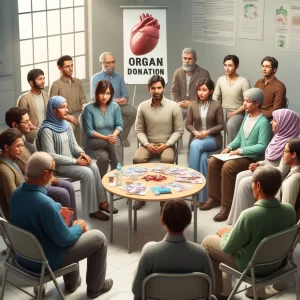Date: October 4, 2024
Revealing the Vital Truth of Living vs. Deceased Donation
Organ transplants primarily have two sources – living donors and deceased donors. Both forms of donation are critical in saving many lives, especially in places such as India, where demand for organs usually outstrips supply. While the number of living and deceased organ donations varies greatly, the processes, ethics, and associated considerations differ. There are also a few significant differences between the two kinds of donation within India’s huge organ and tissue transplantation efforts.
What is a Living Donation?
Living donation refers to a healthy donor voluntarily giving an organ or part of an organ while they are still alive. Most commonly, kidneys and part of the liver are donated by living donors. Living donation may thus provide a lifeline for patients who, due to the sometimes unbearably long period that they can remain off the transplant waitlist, may require an alternative solution; however, organs donated by living donors play a significant role in saving the lives of citizens given the meagre rates of deceased donation in the country against demand.
Therefore, the first thing that a living donation would bring is immediacy. In the case of living donors, patients do not have to wait for a matched organ from a dead donor. The process involves extensive screening to ensure that the donor is a good match and healthy enough, which makes it safer for both the donor and the recipient. It also gives a sense of urgency since the transplantation could be planned, and the condition of the organ is well-known before the process.
What Is a Deceased Donation?
Deceased donation occurs when an individual dies, and the organs are donated to a recipient in need. This type of donation is most often seen after a brain or cardiac death, and it involves multiple organs being transplanted and potentially saving several lives. In cities like Mumbai, where awareness about the significance of organ donation is gradually increasing, deceased donation shall continue to be an essential constituent of the organ transplant foundation in India.
This is a critical difference between deceased donation and living donation because, in living donation, one can donate an organ at a single time, for example, the heart, lungs, pancreas, and intestines. Multiple donations cannot occur through living donation, but through a deceased donor, recovery and transplanting must take place in a highly minute time after death. Thus, it is very vulnerable that the process even makes the whole exercise result in many lost chances for transplant opportunities.
Ethical Concerns
Living donations have their own ethical issues regarding the long-term health of the donor and whether they are actually giving their consent to donate. With advancements in medical science in India, the transplantation of tissues and organs in cities like Mumbai has gained safety, but donors go through extensive investigations, including medical and psychological tests, to ascertain whether they are fit for donation.
The issue of consent concerns the ethics of deceased donation. In India, family members refuse to donate organs after a family member’s demise, sometimes even from a religious point of view and at other times through emotional grounds. Organisations like Transplant India and other NGOs for Organ Donation in Mumbai dedicate massive efforts to making people aware of the merits of deceased donation by educating people that a single donor can save many lives.

Role of NGOs in Support of Both Donations
NGOs play a vital role in supporting both living and cadaveric donations. Transplant India works towards awareness work and fundraising and guides donors and recipients through complex transplantation processes. For example, NGOs helping with liver transplants have made a difference by ensuring that such treatment necessary for those coming from financially weaker sections of society gets done. NGOs also give crowdfunding opportunities for organ transplants by offering to partly assist families with finances that cannot afford surgeries and post-operative costs.
One significant role of NGO involvement is education. Organ donation campaigns in Mumbai have significantly enhanced the number of willing organ donors. These campaigns are crucial in bridging the supply and demand gap for organ transplant services. NGOs often play as middlemen in educating families to how to make donations after death and help provide legal and logistical support so that there are no hitches in procurement and transplant organ processes.
Financial Challenges and Consequences
The biggest challenge that living and dead donations face in India is their financial aspect. In most cases, an organ transplant is too expensive for many individuals, most of whom belong to the poorer class. Financial aid to patients going through organ transplants becomes their safety net. For example, financial assistance for heart transplant patients significantly contributes to bridging life-saving treatments between patients and their ability to pay for such treatments.
Given the financial hurdle, transplant crowdfunding foundations have emerged as a means through which funds for transplant surgeries may be raised. These foundations raise money and spread the word about the donation needs. Crowdfunding for organ transplant surgeries has effectively made communities come together to raise funds for their people in times of need. Transplant India usually advises how these crowdfunding platforms should be filled up to enable families to get the necessary help. Besides crowdfunding, many charitable trusts for liver transplants in Mumbai operate at their best and offer direct funds and assistance to needy patients.

Increasing Rate of Donations through Awareness
One step in India’s plan to bridge the organ shortage gap is raising awareness regarding living and deceased donations. Many people do not know that one can register to become an organ donor while they are alive, and hence, may not be able to facilitate their wishes in the event of an untimely death. How to become an organ donor in India is a topic covered exhaustively by many NGOs through public campaigns. Donations must be carried out transparently, as this is a small way of building trust in the community. Families need to learn the value of donation upon death- that someone could donate and save someone’s life, doing it with dignity.
NGOs in India face many such challenges. Still, by promoting both types of donations, the country can move towards a more sustainable system where supply will finally meet demand. Education campaigns, financial support, and ethical transparency are the three pillars of change in this domain, and the tireless work of NGOs supports them.
How can Transplant India Help
Organisations like Transplant India are making tremendous efforts to increase the rate of living and deceased donations. Transplant India ensures that financial, educational, and robust logistical support helps patients get timely care or life-saving interventions when a transplant is necessary. Their work includes assisting people in economic need, including providing financial assistance for liver and kidney transplantation in India. Thus, economic challenges will not undermine medical needs.
As the leading transplant organisation in the country, Transplant India’s work transcends the saving of lives to fostering greater ownership and a sense of responsibility within the community through organ donation. Its work demonstrates how donation, be it living or after death, could make a difference to people and their families at the most critical stages.
